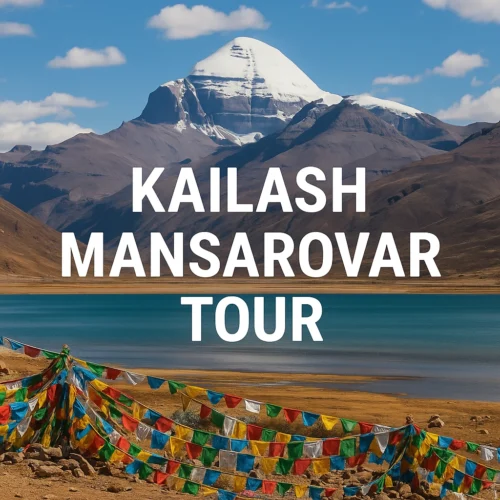

In this, we will cover spiritual importance of Kailash Mansarovar tour comprises of Kailash and Lake Mansarovar. Holy Mount Kailash, towering high at 6,638 meters in the far-flung stretches of the Tibetan Plateau, has divine stature in four prominent religions—Hinduism, Buddhism, Jainism, and Bon. For the Hindus, it is Lord Shiva's earthly dwelling. Buddhists consider it to be the celestial hub of the universe, whereas Jains hold it to be Moksha of their first Tirthankara.
Lying close by is Lake Mansarovar, the world's highest freshwater lake. Taking a dip in its sacred waters is said to wash away sin, and to drink from it grants spiritual blessings.
There are two main options for finishing this pilgrimage:
Trekking Route: Historically tough, but spiritually rewarding. It takes off from India or Nepal and consists of tough days of trekking.
Helicopter Route: A quicker option for those who have less time or mobility issues, typically beginning from Nepalgunj to Simikot, then Hilsa.
Check out our Kailash Mansarovar Yatra Package for a well-organized and smooth journey.
The Yatra runs from May to September, and the ideal months are June to August. In this period, there are clearer skies, more moderate temperatures, and fewer possibilities of weather interruption.
Steer clear of early May and late September if you are worried about snowfall or rain. Tying your trip with Guruji Purnima or Saga Dawa festivals can provide added spiritual satisfaction.
Most pilgrims from India prefer to go through Lipulekh Pass or Nathu La. These routes entail:
Several days of trekking
Sporadic camping in tough terrain
Minimal vehicle assistance
Flight from Kathmandu to Nepalgunj
Helicopter flight to Simikot and further to Hilsa
Road travel to Taklakot and Lake Mansarovar
Parikrama of Mount Kailash for three days
A Kailash Mansarovar Yatra tour package by helicopter can significantly reduce travel time while still offering breathtaking aerial views of the region.
Valid passport (at least 6 months' validity)
Passport-size photos
ID copies
All pilgrims should go in a group using a Chinese-approved tour operator. The operator books:
Tibet Travel Permit
Group Chinese Visa
Aliens' Travel Permit
Daily walking or jogging (5-6 km)
Climbing stairs
Pranayama breathing exercises
Add exercises that enlarge lung capacity. Yoga, particularly Kapalbhati and Anulom Vilom, aids in enhancing respiratory stamina. Check out our Kailash Mansarovar Yatra Tour Package for a well-organized and smooth journey.
Tour operators insist on:
General physical check-up
ECG report
Stress test
These prove you are capable of high-altitude travel.
Look out for signs such as:
Nausea
Dizziness
Breathlessness
Fatigue
Take Diamox or other preventive drugs under medical supervision.
Pilgrimage is a test of patience and emotional strength. Long travel days, basic amenities, and unpredictable weather can be taxing. Luxury Kailash Mansarovar Yatra package will you a best luxurious experience in this fascinating journey.
Start incorporating 10-15 minutes of daily meditation. Carry a prayer book, mantra beads, or religious texts for spiritual grounding.
Thermals and woolens
Waterproof jacket and pants
Trekking boots with good grip
Woolen socks and gloves
Toothbrush, wet wipes, sanitizer
Essential medicines and personal medications
Prayer beads, spiritual journal, mini idol or picture
Expect:
Simple guesthouses with shared rooms
No hot water guaranteed
Electricity supply variable
Food is simple and vegetarian:
Rice, dal, sabzi
Bread, soup, noodles
Take energy bars and dry fruits
Search for agencies registered with:
Ministry of External Affairs (India)
Nepal Tourism Board
Chinese Foreign Affairs Office
Make sure your package has:
Visa, permits, and lodging
Meals and transportation
Oxygen tanks and emergency aid
Trekking route: ₹150,000 to ₹250,000
Helicopter route: ₹250,000 to ₹350,000
Take Chinese Yuan (RMB)
Include pony/porter tips, snacks, and donations
Opt for insurance covering:
High-altitude illness
Trip cancellations
Loss of baggage
Ensure helicopter evacuation is part of the policy, particularly from Hilsa or Taklakot. Check out our Kailash Mansarovar Yatra Package from Kathmandu for a well-organized and smooth journey.
Nepal: Ncell and NTC SIMs function up to Simikot
Tibet: Only limited connectivity beyond Taklakot
Satellite phone rentals are available from some operators
Wi-Fi is thin on the ground and usually paid
Don't touch prayer flags
Take shoes off before entering temples
Avoid loud discussions at spiritual locations
Do carry biodegradable trash bags
Don't take locals' photos without permission
Do dress respectfully
Don't use plastic bottles, use refillable bottles
Reject single-use plastics
Use green toiletries
Take out what you bring in. Try not to leave behind wrappers or prayer flags.
1. Do we need prior trekking experience?
No, but a basic level of fitness and mental preparedness are a must.
2. Can older citizens accompany the tour?
Yes, provided they are medically fit and cleared by a doctor.
3. Is there any dress code?
Layered, modest clothing is ideal. Steer clear of tight or flashy clothing.
4. Can women do the complete Kora?
Yes, women can do the parikrama just like men.
5. Can I bring my own oxygen cylinder?
Most operators like Epic Yatra offer backup oxygen, but you may bring your own.
6. Is alcohol allowed?
No. Alcohol is not tolerated at high elevations and in religious places.
Preparations for Kailash Mansarovar Tour are not merely a travel plan — but an expedition to your soul. Proper physical, mental, and spiritual preparation, and this divine Yatra becomes one of the most life-giving experiences you'll have. Don't forget: not the top you reach the summit of, but yourself.